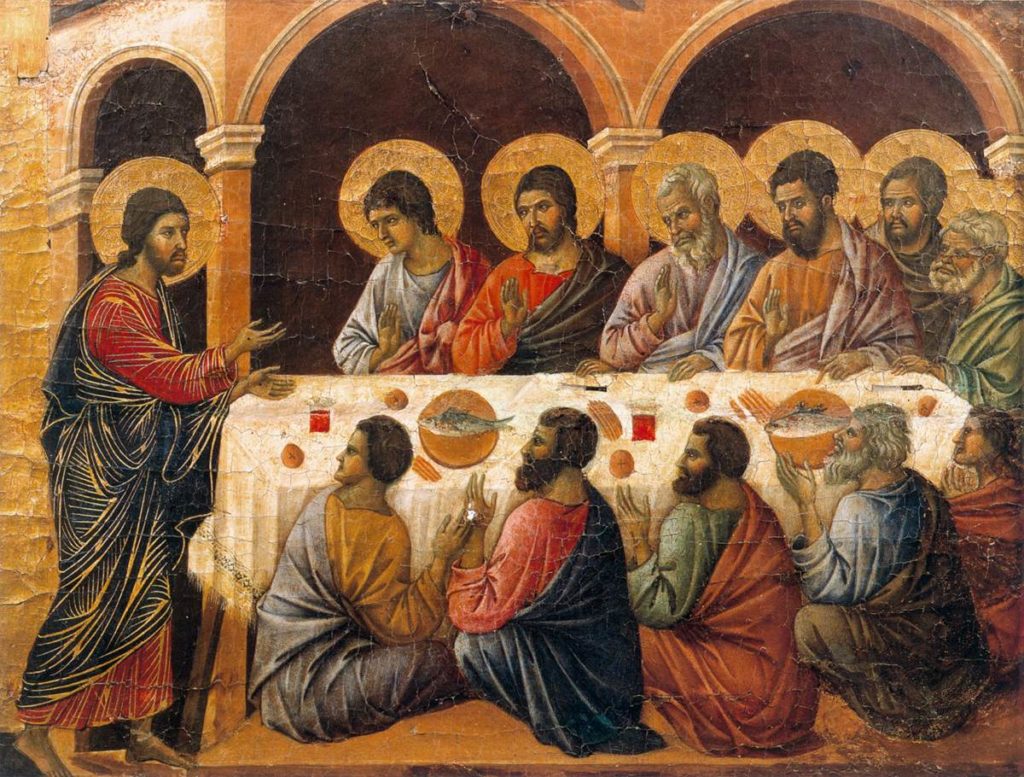You Are Witnesses
Third Sunday of Easter
“Thus it is written that the Messiah would suffer and rise from the dead on the third day and that repentance, for the forgiveness of sins, would be preached in his name to all the nations, beginning from Jerusalem. You are witnesses of these things.” Luke 24:46-48

Risen Christ Appears to Apostles, Duccio (1308-11)
Pope Francis to issue Apostolic Exhortation on Holiness
Pope Francis will next week publish an apostolic exhortation on holiness titled Gaudete et Exsultate, or “Rejoice and be glad”, the Vatican announced Thursday.
Subtitled “on the call to holiness in the contemporary world”, the exhortation will be presented April 9 by Archbishop Angelo De Donatis, vicar general of the Diocese of Rome and archpriest of the Archbasilica of St. John Lateran Italian journalist Gianni Valente and Paola Bignardi, former president of Catholic Action Italy, will also speak at the presentation.
Gaudete et exsultate will be the third apostolic exhortation issued by Pope Francis. In 2016 he issued Amoris Laetia, on love in the family, and in 2013 Evangelii Gaudium, on the proclamation of the Gospel in today’s world. An apostolic exhortation is one form of the ordinary teaching authority of the Pope. Through an exhortation, the Pope conveys a message to faithful about a particular area relevant to living out the Catholic faith. An apostolic exhortation is often written as a follow-up document to a Synod of Bishops, as was the case for Amoris Laetia. Gaudete et Exsultate follows just a little more than a month behind the Congregation for the Doctrine of the Faith’s March 1 letter to bishops on certain aspects of Christan salvation, Placuit Deo, which refers to the errors of Pelagianism and Gnosticism in helping to explain the threat of the errors Pope Francis has called “new Pelagianism” and “new Gnosticism.” According to Placuit Deo, the new Pelagianism is an “individualism centered on the autonomous subject [which] tends to see the human person as a being whose sole fulfilment depends only on his or her own strength.”
The document cites a 2013 address of Pope Francis to explain that the new Gnosticism “presumes to liberate the human person from the body and from the material universe, in which traces of the provident hand of the Creator are no longer found, but only a reality deprived of meaning, foreign to the fundamental identity of the person, and easily manipulated by the interests of man.”
In his latest exhortation, Pope Francis will likely expound on these modern errors giving guidance on how to avoid them and how to
achieve holiness in the modern age.
By Hannah Brockhaus
Readings for the Week
Monday: Acts 6:8-15; Ps 119:23-24, 26-27, 29-30; Jn 6:22-29
Tuesday: Acts 7:51 — 8:1a; Ps 31:3cd-4, 6, 7b, 8a, 17, 21ab; Jn 6:30-35
Wednesday: Acts 8:1b-8; Ps 66:1-3a, 4-7a; Jn 6:35-40
Thursday: Acts 8:26-40; Ps 66:8-9, 16-17, 20; Jn 6:44-51
Friday: Acts 9:1-20; Ps 117:1bc, 2; Jn 6:52-59
Saturday: Acts 9:31-42; Ps 116:12-17; Jn 6:60-69
Sunday: Acts 4:8-12; Ps 118:1, 8-9, 21-23, 26, 28, 29;1 Jn 3:1-2; Jn 10:11-18
Saints & Special Observances
Sunday: Third Sunday of Easter
Tuesday: Income Tax Day
Saturday: St. Anselm
